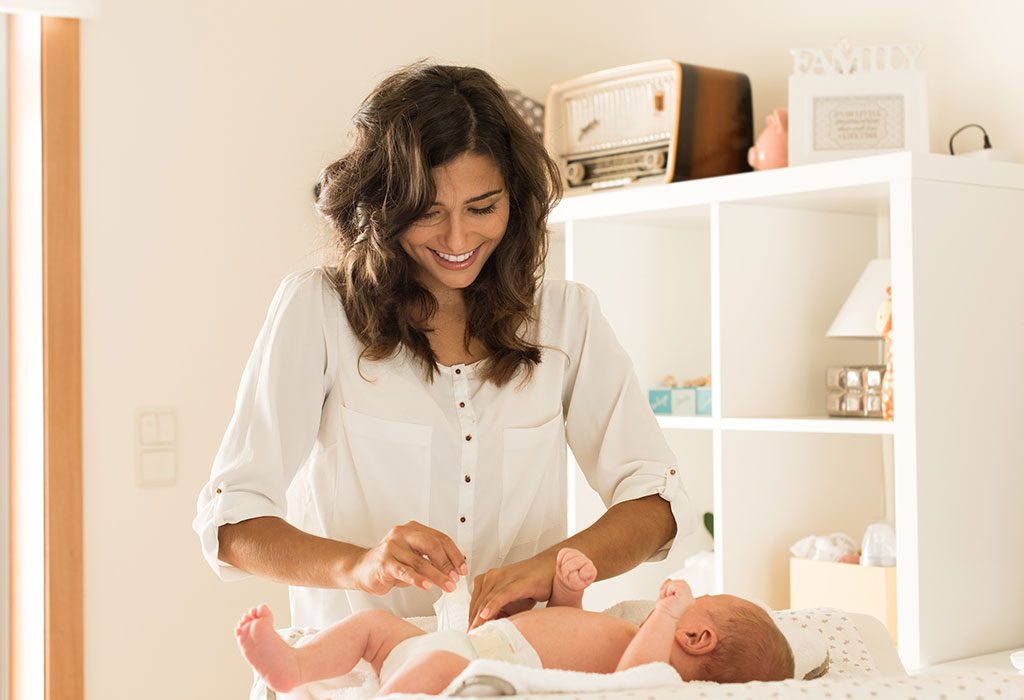In this Article
If you have not read your antenatal books properly, then your baby’s diaper usage may startle you. If you think that babies poop and pee like adults, then you are highly mistaken. The first year after delivery can be an extremely demanding year, where you will be struggling with your baby’s feeding and diaper changing schedule. Here in the following article, we will get your facts right and let you know how many diapers your little one will require daily. The aim is not to scare the newbie-parents but to prepare you mentally to deal with your baby’s diaper changing requirements.
How Many Diapers Should Your Infant Normally Use a Day?
We shall acquaint you with the average diaper usage as per the age of your baby in the following paragraphs:
Newborn to a Month Old
Newborn babies soil more diapers in comparison to older babies. Therefore, if your baby is under one month of age, then you can expect to change 6 to 10 diapers per day. Around this age, your baby may have 3 to 4 bowel movements a day and pee after every feed.
Over 1-Month-Old Baby
As your baby turns one month old, you may notice fewer soiled diapers, and thus you may notice that your baby may require up to 4 to 6 diapers in a day. If your baby is exclusively on breast milk, then he may have more soiled diapers in comparison to a baby who is on formula milk. Breast milk is easy to digest, which means more poops and thus more soiled diapers.
How Many Diapers Per Day by Age Chart (Up to 1 Year)
Here in the following chart, we have discussed how many diapers your baby may require on daily and monthly bases.
| Age Of The Baby | Diaper Usage Per Day | Diaper Usage In One Month |
| 0 to 1-month-old baby | 10 to 12 diapers | 320 diapers |
| 1 to 5 months old baby | 8 to 10 diapers | 240 diapers |
| 5 to 9 months old baby | 8 diapers | 240 diapers |
| 9 to 12 months old baby | 8 diapers | 240 diapers |
Above-mentioned diaper usage is an average usage of a baby of a particular age. However, it may vary slightly in all the babies.
When Should You Change Your Baby’s Diaper?

As soon as you find your baby’s diaper soiled and wet, it is recommended that you change it. The infection that may get caused because of urine and faeces is very painful for your baby, and it is very difficult to treat as well.
It is recommended that you check for your baby’s soiled diaper when your baby is awake. Avoid waking your baby to change his diaper. You may check and change your baby’s diaper before feeding him, as babies tend to sleep after their feeding session. You can also change your baby’s diaper just before retiring for the night.
You may notice a soiled diaper every 1 to 3 hours with your newborn baby and also after you finish feeding them. This happens because their bowels get stimulated, and thus babies pass the bowels. You should change the cloth diaper when it gets wet, but you can wait for a disposable diaper to become wet and heavy before changing them.
What if Your Baby’s Wet Diaper Count is too Low?
On average, your baby may be wetting 6 to 8 diapers in a day. If you notice that your baby has fewer wet diapers, then this may be a cause for concern. Fewer wet diapers mean that your baby is not getting enough milk and this can make your baby feel dehydrated. Dehydration is a cause of great concern in babies, and this can lead to various health complications. As soon as you notice this change of lesser average diapers per day; get in touch with your baby’s doctor. However, if you are worried about your breast milk supply, you can discuss it with your doctor and know various ways of increasing your milk supply.
What if Your Baby’s Wet Diaper Count is too High?
Your baby’s high diaper usage may scare you, but it is very normal for newborn babies to the soil every 1 to 3 hours. This will get better as your baby grows. Your baby will develop better control of his bladder and bowel movement by the time he is one year old
Now that you know how to go about taking on diaper responsibilities is a whole lot easier!









